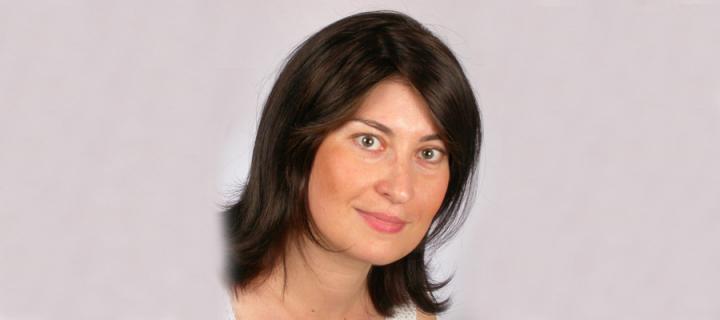Simona Nistor-Grahl
Simona Nistor-Grahl's childhood in Romania brought her a passion for science, and led her to Edinburgh where she completed her PhD in Cell and Molecular Biology.
| Name | Simona Nistor-Grahl |
| Degree |
PhD, Cell and Molecular Biology |
| Year of Graduation | 2000 |

Your time at the University
I chose science, or I was chosen by it, when I was a child growing up in Romania. Although life was frozen in the darkest age of Communist dictatorship, and scientists were considered “enemies of the people”, I knew that true science survives despite human rights infringements, distasteful manoeuvering, or instrumentalisation of culture and mind. During the 1970s and 1980s, due to the legacy of repression of English as a foreign language, living scientists were out of touch with most rapid advances in medical-scientific literature, relying exclusively on well-archived, pre-Cold-War French sources. Hence my genuine wish to learn English, and to treasure it as a system of culture and thought. In Romania, this translated into long-term resistance, transitioned by dynamics of post-revolutionary decommunisation into searching for a career in science. As an undergraduate medical student, my scientific aim was to contemplate that unique synergy of control and freedom that nurtures human growth, to reach genuine inquisitiveness that is not satisfied with surface explanations and, later on, to apply educated rationalism in support of my desire for change and improvement.
It was a great opportunity when I found out about the initiative of the Darwin Trust of Edinburgh, chaired by Professor Sir Kenneth Murray, to support career aspirations like mine. When I applied for a research fellowship with the the University of Edinburgh, I was elected for a PhD programme in Cell and Molecular Biology, and this has reconfigured my profession, and my entire life. From the beginning of my PhD study, I was exposed to the most advanced analytical thinking and to the most modern technology in the field. I had to utilise the maximum intellectual capacity to make the most out of simpler, easy-to-learn methods of investigation, and I acquired a very complex mechanism of thinking in a relatively short time.
Historical bonds between Scotland and Romania challenged my perspective of Edinburgh as a foreign city, and the thought of being alone in a highly competitive world turned soon to be at odds with my true feeling of enthusiasm and inner joyfulness. Romania has a Royal Family which had a lot of connections with its British counterpart, and Queen Maria of Romania was the former Princess Marie of Edinburgh, granddaughter of Queen Victoria. But what impressed me most in Edinburgh during my stay was the overall acceptance of social responsibility, the University library, and the very high quality of public transportation. I didn’t have to drive once when I lived in the UK, and while having a car would have occasionally made things easier, the fact that I got wherever I needed to go - with the exception of select rural areas - by public transport, was pretty amazing. In Scotland, people were very proud to live in a society and contribute to a system that tried its best to take care of those who are less fortunate - and this is a feature of Scottish society that I very much value even today.
Historical bonds between Scotland and Romania challenged my perspective of Edinburgh as a foreign city.
Tell us about your experiences since leaving the University
My interest in molecular biology, especially when applied to cancer biology and treatment, grew later into a true passion. Recognition as an oncology research fellow with the Mayo Clinic Rochester MN, USA, brought additional responsibilities that were essential to my formation as a physician-scientist. Later in my life, as I relocated to Germany, the desire to remain active in high-level science encompassed both myself and my peer environment at the University Hospital of Ulm. We set up a DNA microarray laboratory for the Biochemistry department, and contributed to several research projects in developmental biology.
Over time, I developed into a patient-service-oriented physician and scientist with first-hand experience in cellular therapies for solid tumors, i.e. dendritic cell therapy and stem cell transplantation. Together with colleagues and partners, I founded in 2005 a pharmacovigilance consulting company in Germany, offering scientific services to academia and industry clients. My company is committed to patient safety. The range of services offers reliable support to safety governance and risk management activities including characterisation of identified and potential medication risks, proposals for mitigation/minimisation measures, safety go-no-go criteria for the clinical programmes, safety-related regulatory submissions, responses to regulatory safety queries, and definition of the risk component of the benefit and risk assessments. Expertise from extensive and continuous training processes creates value across pharmacovigilance and the main areas of basic, translational, and clinical research.
At present, I act as a scientific partner to the Brighton Collaboration on vaccine safety, and I'm a member of the reference group for neonatal and obstetric case definitions. I am also a safety physician and associate editor for the Cochrane Clinical Answers in Hematology and Oncology.
Alumni wisdom
Optimism and enthusiasm for new ideas are contagious and powerful, if accompanied not by a casual confidence that effort alone will find a solution, but by a problem-solving mentality and preparation for potential obstacles. Love of science and nature is an essential springboard.

